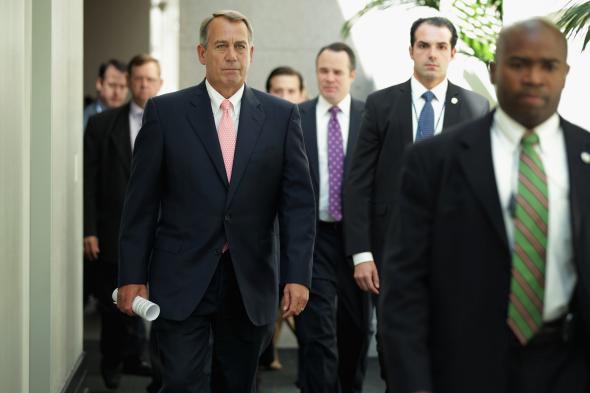If the government shuts down, it may be because House Republicans were contemplating the next fight over the debt limit more than the current one over keeping the government running. (Update, Oct. 1: The government has shut down.) Though closing the federal government will affect the economy, a breach of the debt limit could cause economic collapse. Within the GOP, there are two major strains of thought: those who would like to fight now over funding the government and those who would like to fight later over a debt limit increase when the Treasury Department hits its borrowing limit Oct. 17. Each camp’s view is shaped by how seriously its individual members take the warnings of debt limit cataclysm, and how he or she interprets the president’s declaration that he will not negotiate on any matters tied to increasing the debt limit.
The “fight later” group argues for settling the question of funding the government in order to close ranks and focus the public on the bigger fight over the debt limit. Effectively that means voting for the so-called “clean” continuing resolution—the measure passed by Senate Democrats on Friday.
Their thinking is based on the idea that Republicans will have more leverage on the debt limit—and the president will have less. In the current fight, Republicans, who have tried to use the government funding crisis to kill or delay Obamacare, have been bucking public opinion. Though people may not like the law, polls have shown that they don’t think it is worth risking a government shutdown to attack it. In a recent CBS poll, for example, 56 percent said they wanted Congress to make the health care law work and only 38 percent said the law should be stopped by defunding it. When it comes to the debt ceiling, however, the country supports the Republican position. Fifty-five percent in the CBS/New York Times poll said the debt ceiling should only be raised if spending cuts are also enacted. Another 24 percent didn’t want it raised at all. That means 79 percent of Americans disagree with the president who wants the debt ceiling raised without conditions.
Here the president’s interests and the interests of Senate Democrats could split in a way that might offer an opening to Republicans. The president is not up for re-election. It doesn’t matter to him that only about 20 percent of the country thinks it’s a good idea to lift the debt limit without cutting spending, but to some senators up for re-election it matters quite a lot. Could Majority Leader Harry Reid get a “clean” debt limit bill through the Senate? Red state Democratic senators up for re-election in 2014 have already had to reaffirm their support for the unpopular Obamacare. They might not want to take another unpopular vote.
The president has said he won’t negotiate on the debt limit. In this game of chicken, he says he has thrown the steering wheel out of the window. But can he do that? One senator pointed me to a passage from Bob Woodward’s The Price of Politics in which Obama’s former Treasury secretary explains the catastrophe that would ensue if the president didn’t sign a debt limit bill—even one he didn’t like. “It would have massive effects,” Geithner said. “Every financial asset in the United States, every financial asset in the world, rests on that basic foundation [of a stable U.S. Treasury securities] … you put that in question, everything comes crashing down and you cannot rebuild it. It’s something that will be lasting for generations.”
If part of this high-stakes gamble is interpreting the mindset of your opponent, House Republicans imagine that President Obama is driving a bus full of children. No matter how much he talks tough, he’ll swerve at the last minute because too much is at stake.
The other GOP group, known as the “fight now” camp, buys into the overwhelming economic consensus that breaching the debt limit is insane. Even walking up to it is dangerous. The General Accounting Office found that in 2011 simply approaching the deadline cost $1.4 billion in extra borrowing costs. These Republicans think that in a showdown over the debt limit they will have to buckle, which would be their second capitulation in less than a month if they cave now on the government shutdown. Their supporters would riot. So, given the cave that they see coming on the debt ceiling, they must hold firm on not funding the government and endure a limited shutdown, which their constituents will only praise them for.
On Monday afternoon, it appeared as if House Speaker John Boehner was going with option two—a fight now rather than a certain buckle over the debt limit later. The House sent a funding bill back to the Senate with yet another round of amendments. This time they were asking to delay the implementation of the Affordable Care Act’s individual mandate and asked for an amendment to remove the congressional subsidy for insurance coverage, known as the Vitter amendment. Boehner said there would be no vote on a clean continuing resolution, which suggested we were headed to Shutdownsville.
But a careful reading of what Boehner actually said suggests he was talking just about that moment in time. When the Senate rejects the latest House GOP effort Monday night, Boehner could still bring up the clean Senate funding bill and pass it with Democratic votes before midnight or after only a brief shutdown. That would cause him heartburn in his conference, but it might tell us that he has decided to make peace now so that he can fight later.
